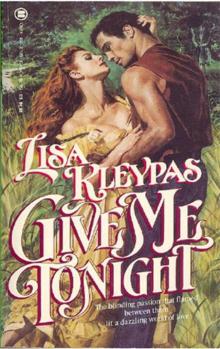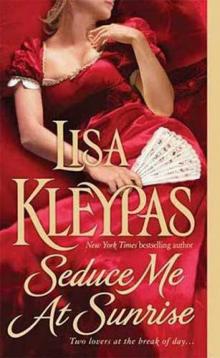- Home
- Lisa Kleypas
Devil in Spring Page 24
Devil in Spring Read online
Page 24
She loved this place.
A young matron approached. She was tidy and slender and bosomy, with curly brown hair and long-lashed hazel eyes. “Lady St. Vincent?” she asked, and curtseyed deeply. “Mrs. O’Cairre.”
“A pleasure,” Pandora said, beaming.
“I’ve never been so intrigued as I was by your letter,” Mrs. O’Cairre said. “Your board game sounds very clever, milady.” She was a well-spoken woman with the musical hint of a brogue. There was a lively air about her that Pandora liked exceedingly. “Would you like to sit with me and discuss your plans for it?”
They went to sit at a table in a sheltered spot at the side of the room. For the next hour, they talked about Pandora’s game and what components it would require, while she unearthed sketches, notes, and prototypes from her valise. It was a shopping-themed game, with pieces that moved around a track that wove through the departments of a whimsically detailed store. It would include merchandise cards, play money, and chance cards that would either help or hinder the players’ progress.
Mrs. O’Cairre was enthusiastic about the project, making suggestions about various materials to use for the game components.
“The most important issue is the folding game board. We can do lithograph printing directly onto the board with a flat-bed press. If you want a multi-colored game board, we could create a metal plate for each color—five to ten would be sufficient—and apply ink to the board in layers until the image is complete.” Mrs. O’Cairre viewed Pandora’s hand-painted game board thoughtfully. “It would be much cheaper if we only applied the image in black and white, and you hired women to hand-color the image. But of course, that would be much slower. If your board game is in high demand, which it will be, I’m sure, you’ll make greater profits by producing the game entirely by machine.”
“I would prefer the hand-colored option,” Pandora said. “I want to provide good jobs for women who are trying to support themselves and their families. There’s more than profits to consider.”
Mrs. O’Cairre stared at her for a long moment, her eyes warm. “I admire that, milady. Very much. Most ladies of your rank, if they think of the poor at all, do little more than knit stockings and caps for charity groups. Your business would help the poor far more than knit-work.”
“I hope so,” Pandora said. “Believe me, my knitting wouldn’t help anyone.”
The woman laughed. “I do like you, milady.” She stood and rubbed her hands together briskly. “Come to the back rooms, if you please, and I’ll give you a pile of samples to take home and view at your leisure.”
Scooping up her papers and game materials, Pandora dumped them into her valise. She glanced over her shoulder at Dragon, who was watching her from beside the door. He stepped forward as he saw that she was heading to the back of the shop, but she shook her head and gestured for him to stay there. Frowning slightly, he folded his arms and remained in place.
Pandora followed Mrs. O’Cairre past a waist-high counter where a pair of boys were busy collating pages. To the left, an apprentice worked a treadle-operated letter press with huge gears and levers, while another man operated a machine with large copper rollers that pressed images continuously on long rolls of paper.
Mrs. O’Cairre led her to a sample room brimming with materials. Moving along a wall of shelves and drawers, Mrs. O’Cairre began to collect pieces of paper, card stocks, boards, binding canvas and muslins, and a variety of type-specimen lettering sheets. Pandora followed closely behind her, receiving handfuls of pages and dropping them into her valise.
They both paused at a discreet knock.
“It’s likely the warehouse boy,” Mrs. O’Cairre said, heading to the other side of the room. While Pandora continued to browse among the shelves, the printer opened the door just enough to reveal a boy in his teens, with a cap pulled low over his forehead. After a brief, muttered exchange, Mrs. O’Cairre closed the door. “Milady,” she said, “I beg your pardon, but I have to give instructions to a deliveryman. Will it trouble you if I leave you here for one minute?”
“Certainly not,” Pandora said. “I’m as happy as a clam at high water.” She paused to look more closely at the woman, who was still smiling . . . but distress had exerted subtle tension over her features like a drawstring bag being cinched. “Is something wrong?” Pandora asked in concern.
The woman’s face cleared instantly. “No, milady, it’s only that I don’t like to be interrupted when I’m with a customer.”
“Don’t worry on my account.”
Mrs. O’Cairre went to a set of drawers and pulled out an open-ended envelope. “I’ll be back sooner than you can take a hop, skip, and a jump.”
As the printer exited through the warehouse door, closing it firmly behind her, something fluttered to the floor in her wake. A slip of paper.
Frowning, Pandora set down her valise and went to retrieve the small piece of paper. It was blank on one side and printed on the other with what appeared to be different samples of typographic lettering, but it wasn’t organized like the type-specimen sheets. Had it fallen from the envelope that Mrs. O’Cairre had just pulled from the drawer? Was it important?
“Bother,” she muttered. Opening the door, she went after the printer, calling her name. When there was no reply, Pandora proceeded cautiously through a dimly lit gallery that opened to a warehouse working space. A row of segmented windows near the roof let in a wash of greasy light that fell over lithographic stones and metal plates, rollers, machinery parts, and stacks of filter troughs and vats. The heavy smell of oil and metal was cut with the welcome pungency of wood shavings.
As Pandora emerged from the gallery, she saw Mrs. O’Cairre standing with a man, next to the massive bulk of a nearby steam-powered printing machine. He was tall and solid-looking, with a square face and a broad, bunchy chin, as if more than one chin had gone into the making of it. Fair-haired and moon-pale, he possessed brows and lashes so light as to appear nonexistent. Although he was dressed in inconspicuous dark clothes, his stylish chimney pot hat would only have been worn by a gentleman of means. Whatever else he might be, this was no deliveryman.
“Forgive me,” Pandora said, approaching them, “I wanted to ask—” She halted in her tracks as Mrs. O’Cairre whirled to face her. The flash of undisguised horror in the woman’s eyes was so startling that Pandora’s mind went blank. Her gaze darted back to the stranger, whose lash-less cobra eyes regarded her in a way that made her flesh creep.
“Hello,” Pandora said faintly.
He took a step toward her. Something about the movement sparked the same instinctive response she felt upon seeing a spider’s articulated skitter, or a snake’s undulation.
“Milady,” Mrs. O’Cairre burst out, quickly moving into his path and taking Pandora’s arm, “the warehouse is no place for you . . . your fine dress . . . there’s grime and oil everywhere. Let me take you back inside.”
“I’m sorry,” Pandora said in confusion, letting the woman bustle her quickly to the gallery and into the shop offices. “I didn’t mean to interrupt your meeting, but—”
“You didn’t.” The woman forced a light laugh. “The deliveryman was just telling me about a problem with an order. I’m afraid I must see to it right away. I hope I’ve given you enough information and samples.”
“Yes. Have I caused a problem? I’m sorry—”
“No, but it would be best if you left now. There is much to do here.” She ushered Pandora through the office, snatching up the valise by its handles without stopping. “Here is your bag, milady.”
Confused and chagrinned, Pandora went through the shop with her, toward the front where Dragon was waiting.
“I’m afraid I don’t know how much time it will take,” Mrs. O’Cairre said. “The problem with the order, that is. If it turns out that we’ll be too busy to print your game, there’s a printer I can recommend. Pickersgill’s, in Marylebone. They’re very good.”
“Thank you,” Pandora said, staring at h
er in concern. “Again, I’m sorry if I did something wrong.”
The printer smiled slightly, although her air of urgency remained. “Bless you, milady. I wish you very well.” Her gaze flickered to Dragon’s unreadable face. “You’d best go quickly—the construction and street traffic worsens toward the evening.”
Dragon responded with a short nod. He took the bag from Pandora, opened the door, and whisked her outside unceremoniously. They proceeded along the wooden plank walk toward the waiting carriage. “What happened?” Dragon asked brusquely, reaching out to steer her around a rotting hole in the planks.
“Oh, Dragon, it was so very odd.” Pandora described the situation rapidly, some of her words tumbling over each other, but he seemed to follow without difficulty. “I shouldn’t have gone out to the warehouse,” she finished contritely. “But I—”
“No, you shouldn’t.” It wasn’t a reprimand, only a quiet confirmation.
“I think it was bad that I saw that man. Perhaps there’s a romantic involvement between him and Mrs. O’Cairre, and they don’t want to be found out. But it didn’t look that way.”
“Did you see anything else? Anything in the warehouse that didn’t seem to belong?”
Pandora shook her head as they reached the carriage. “I can’t think of anything.”
Dragon opened the door and pulled the step down for her. “I want you and the driver to wait here for five minutes. I have to do something.”
“What is it?” Pandora asked, climbing into the carriage. She sat and took the valise from him.
“Call of nature.”
“Footmen don’t really have calls of nature. Or at least they’re not supposed to mention it.”
“Keep the shades down,” he told her. “Lock the door, and don’t open it for anyone.”
“What if it’s you?”
“Don’t open it for anyone,” Dragon repeated patiently.
“We should come up with a secret signal. A special knock—”
He closed the door firmly before she could finish.
Disgruntled, Pandora settled back into the seat. If there was anything worse than feeling bored or anxious, it was feeling both things at the same time. She cupped her hand over her ear and tapped the back of her skull, trying to settle an annoying high-pitched tone. It took a few minutes of dedicated tapping. Finally she heard Dragon’s voice outside the carriage, and felt the faint jostle of the vehicle as he climbed up beside the driver. The carriage pulled away and proceeded along Farringdon, heading out of Clerkenwell.
By the time they returned to the Queen’s Gate terrace, Pandora was nearly beside herself with impatient curiosity. It took all her self-restraint to keep from exploding out of the carriage when Dragon opened the door and pulled down the step.
“Did you go back into the printer’s shop?” she demanded, remaining seated. It would be improper to stand outside and talk with him on the street, but there would be no privacy once they entered the house. “Did you talk to Mrs. O’Cairre? Did you see the man I told you about?”
“I pushed my way in to have a look around,” Dragon admitted. “She was none too pleased, but no one there could stop me. I didn’t see the man.”
He stood back, waiting for Pandora to leave the carriage, but she didn’t move. She was certain there was something he hadn’t told her. If so, he would talk to Gabriel about it, and then she would have to find out about it secondhand.
When he moved back into the doorway and gave her a questioning glance, Pandora said earnestly, “If I’m to trust you, Dragon, you can’t hide things from me, or I’ll never be sure of you. Besides, withholding important information isn’t protecting me. Just the opposite. The more I know, the less likely I am to do something foolish.”
Dragon considered that and relented. “I walked through the office rooms, and went out to the warehouse. I saw . . . things, here and there. Glass and rubber tubes, metal cylinders, traces of powdered chemical compounds.”
“But those things are common at a printer’s works, aren’t they?”
A notch appeared between his black brows, and he nodded.
“Then why are you concerned?” she asked.
“They’re also used for making bombs.”
Chapter 18
As soon as Gabriel arrived home after a long day of meetings, he was greeted by the sight of Drago awaiting him in the entrance hall.
“Milord.” Drago moved forward to assist him, but was pointedly shouldered aside by the first footman, who collected Gabriel’s hat and gloves. Gabriel sternly suppressed a smile, knowing that Drago hadn’t yet learned the order of precedence concerning the small rituals of the household. Certain tasks defined a servant’s status and would not be relinquished easily.
After shooting a quick, scathing glance at the first footman’s back, Drago returned his attention to Gabriel. “A word with you, milord?”
“Of course.” Gabriel led the way to the nearby morning room, where they both went to stand at one of the front bay windows.
As Drago gave him a succinct account of the visit to the Clerkenwell printer’s shop, including their abrupt exit, and the suspicious items in the offices and warehouse, Gabriel listened with a growing frown. “What was the chemical compound? Could you hazard a guess?”
For answer, Drago pulled a small, cork-stoppered glass tube from his coat pocket and handed it to him. Gabriel held it up and rotated it slowly, watching a few salt-like grains roll inside.
“Chloride of potash,” Drago said.
It was a common and easily recognizable chemical, used in soap, detergents, friction matches, fireworks, and ink. Gabriel handed the tube back to him. “Most people wouldn’t see cause for concern upon finding this at a printer’s works.”
“No, milord.”
“But something about it seemed dodgy to you.”
“It was the look of things. The way Mrs. O’Cairre behaved. The man Lady St. Vincent saw. Something’s not right about the place.”
Bracing one hand on the niche framing of the bay window, Gabriel regarded the quiet street outside, and drummed his fingers on the wood paneling. “I trust your instincts,” he finally said. “You’ve seen enough trouble to know when it’s brewing. But the police will dismiss this out of hand for lack of compelling evidence. And I don’t know of a detective in the entire department who isn’t corrupt or an idiot.”
“I know who to talk to.”
“Who?”
“Doesn’t like his name to be mentioned. He says most London detectives are too well known by their appearance and habits to be of any use. Soon they’ll make a clean sweep of the department and create a special branch. That’s a secret, by the way.”
Gabriel’s brows lifted. “How do you know all this when I don’t?”
“You’ve gone missing of late,” Drago said. “Something about a wedding.”
A smile tugged at Gabriel’s lips. “Talk to your contact as soon as possible.”
“I’ll go tonight.”
“One more thing.” Gabriel hesitated, almost dreading the answer to what he was about to ask. “Did you have any difficulties with Lady St. Vincent? She didn’t argue or try to evade you?”
“No, milord,” Drago replied in a matter-of-fact manner. “She’s a brick.”
“Oh,” Gabriel said, bemused. “Good.” He headed upstairs to find his wife, puzzling over the statement. In London street cant, calling someone a brick was the highest possible praise, used only for a man who was exceptionally loyal and good-hearted. Gabriel had never heard Drago pay such a compliment to anyone. In fact, he’d never heard of a woman being called a brick until now.
Pandora’s voice drifted from the direction of her bedroom, where she changed her clothes and had her hair arranged. At his insistence, she slept in his bed each night. She’d offered a few half-hearted objections at first, pointing out that she was a restless sleeper, which was true. However, whenever she awakened him with her tossing and turning, he solved her problem—and his—b
y making love to her until she fell into an exhausted slumber.
Drawing closer to the room, Gabriel paused with a smile as he heard Ida delivering a lecture about ladylike delicacy, which appeared to have been inspired by an article in a recent periodical.
“. . . ladies aren’t supposed to rush from room to room trying to help people,” the lady’s maid was saying. “The article said you should recline on a chaise, all fragile and wan, and make people help you.”
“And be an inconvenience to everyone?” Pandora asked heatedly.
“Everyone admires delicate ladies,” the lady’s maid informed her. “The article quoted Lord Byron: ‘There’s a sweetness to woman’s decay.’”
“I’ve read plenty of Byron,” Pandora said indignantly, “and I’m sure he never wrote such twaddle. Decay, my foot. What periodical was that? It’s appalling enough to advise healthy women to act like invalids, but to misquote a fine poet in the bargain—”
Gabriel knocked at the door, and the voices fell silent. Making his face impassive, he pushed his way in, and was greeted with the charming sight of his wife dressed in nothing but her corset, chemise, and drawers.
Staring at him with wide eyes, Pandora blushed from head to toe. She cleared her throat and said breathlessly, “Good evening, my lord. I’m . . . changing for dinner.”
“So I see.” His gaze traveled slowly over her, lingering at the gentle weight of her breasts pushed upward and outward by the corset.
Ida snatched up the circle of a discarded dress on the floor, and said to Pandora, “Milady, I’ll fetch a robe—”
“No need,” Gabriel said. “I’ll take care of my wife.”
Looking flustered, Ida bobbed a curtsey and fled, closing the door behind her.
Pandora stood still, radiating nervous energy as Gabriel came farther into the room. “I . . . I suppose Dragon talked to you.”

 Devil in Spring
Devil in Spring Sugar Daddy
Sugar Daddy Devil in Winter
Devil in Winter Dreaming of You
Dreaming of You Christmas Eve at Friday Harbor
Christmas Eve at Friday Harbor Love, Come to Me
Love, Come to Me Only With Your Love
Only With Your Love Suddenly You
Suddenly You Secrets of a Summer Night
Secrets of a Summer Night Cold-Hearted Rake
Cold-Hearted Rake Where's My Hero?
Where's My Hero? Gifts of Love
Gifts of Love Married by Morning
Married by Morning Then Came You
Then Came You Wish List
Wish List Where Dreams Begin
Where Dreams Begin A Historical Christmas Present
A Historical Christmas Present Somewhere I'll Find You
Somewhere I'll Find You Scandal in Spring
Scandal in Spring Someone to Watch Over Me
Someone to Watch Over Me Worth Any Price
Worth Any Price Prince of Dreams
Prince of Dreams It Happened One Autumn
It Happened One Autumn Love in the Afternoon
Love in the Afternoon Devil's Daughter
Devil's Daughter A Wallflower Christmas
A Wallflower Christmas Tempt Me at Twilight
Tempt Me at Twilight Brown-Eyed Girl
Brown-Eyed Girl Mine Till Midnight
Mine Till Midnight Again the Magic
Again the Magic Lady Sophia's Lover
Lady Sophia's Lover Because You're Mine
Because You're Mine Midnight Angel
Midnight Angel Smooth-Talking Stranger
Smooth-Talking Stranger Blue-Eyed Devil
Blue-Eyed Devil Hello Stranger
Hello Stranger Dream Lake
Dream Lake Devil's Daughter: The Ravenels Meet the Wallflowers
Devil's Daughter: The Ravenels Meet the Wallflowers A Christmas to Remember
A Christmas to Remember Smooth Talking Stranger
Smooth Talking Stranger Crystal Cove
Crystal Cove Marrying Winterborne
Marrying Winterborne Stranger in My Arms
Stranger in My Arms Devil in Disguise
Devil in Disguise Worth Any Price bsr-3
Worth Any Price bsr-3 Give Me Tonight
Give Me Tonight Rainshadow Road fh-2
Rainshadow Road fh-2 Seduce Me At Sunrise
Seduce Me At Sunrise I Will
I Will Someone to Watch Over Me bsr-1
Someone to Watch Over Me bsr-1 Lady Sophias Lover bsr-2
Lady Sophias Lover bsr-2 A Hathaway Wedding
A Hathaway Wedding A Hathaway Wedding (Hathaways Bk2.5)
A Hathaway Wedding (Hathaways Bk2.5) Worth Any Price - Bow Street 3
Worth Any Price - Bow Street 3 Christmas with Holly
Christmas with Holly